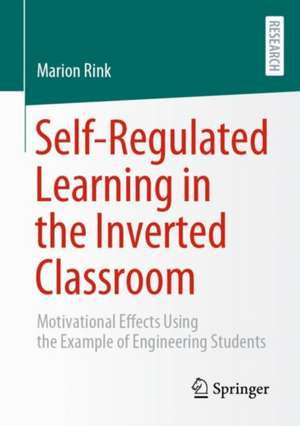Self-Regulated Learning in the Inverted Classroom: Motivational Effects Using the Example of Engineering Students
Autor Marion Rink Traducere de Joanne Hasletten Limba Engleză Paperback – 21 mar 2024
Based on the Self-Determination Theory of Richard M. Ryan and Edward L. Deci, this qualitative study examines how learning in the Inverted Classroom affects the basic psychological needs of autonomy, competence and relatedness of higher education engineering students. A central aspect is the promotion of the students' intrinsic learning motivation through support measures and appropriate didactical design.
Preț: 579.34 lei
Preț vechi: 681.58 lei
-15% Nou
Puncte Express: 869
Preț estimativ în valută:
110.86€ • 116.04$ • 92.27£
110.86€ • 116.04$ • 92.27£
Carte disponibilă
Livrare economică 10-24 martie
Preluare comenzi: 021 569.72.76
Specificații
ISBN-13: 9783658441043
ISBN-10: 3658441046
Ilustrații: XV, 225 p. 9 illus., 8 illus. in color.
Dimensiuni: 148 x 210 mm
Greutate: 0.29 kg
Ediția:2024
Editura: Springer Fachmedien Wiesbaden
Colecția Springer
Locul publicării:Wiesbaden, Germany
ISBN-10: 3658441046
Ilustrații: XV, 225 p. 9 illus., 8 illus. in color.
Dimensiuni: 148 x 210 mm
Greutate: 0.29 kg
Ediția:2024
Editura: Springer Fachmedien Wiesbaden
Colecția Springer
Locul publicării:Wiesbaden, Germany
Cuprins
Introduction.- Fundamentals of the Inverted Classroom Model.- Fundamentals of Self-Regulated Learning.- Collaborative Learning.- State of Research.- Empirical Study.- Outlook.- Appendix.
Notă biografică
Dr. Marion Rink works as a project manager for a digital agency. She also leads workshops about her research into e-learning and is a freelance writer.
Textul de pe ultima copertă
The Inverted Classroom is a blended learning scenario that consists of two phases: In the Online Phase the learners acquire learning content using interactive learning materials, primarily videos, provided by the teacher online. In a second stage, there is an Attendance Phase at the higher education institution with the purpose of learners processing, practising and deepening their understanding of what they have already learnt in a class with other stakeholders.
Based on the Self-Determination Theory of Richard M. Ryan and Edward L. Deci, this qualitative study examines how learning in the Inverted Classroom affects the basic psychological needs of autonomy, competence and relatedness of higher education engineering students. A central aspect is the promotion of the students' intrinsic learning motivation through support measures and appropriate didactical design.
About the author
Dr. Marion Rink works as a project manager for a digital agency. She also leads workshops about her research into e-learning and is a freelance writer.
Caracteristici
Promotion of the intrinsic learning motivation Appropriate didactical design Qualitative study
